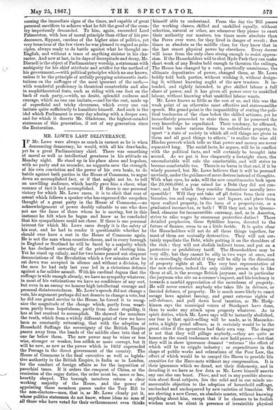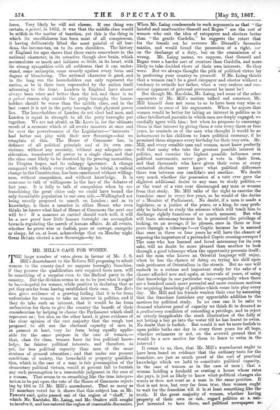MR. LOWE'S LAST DELIVERANCE.
IF Mr. Lowe were always as much in earnest as he is when denouncing democracy, he would, with all his drawbacks, yet be a great Parliamentary chief. There was something of moral as well as intellectual greatness in his attitude on Monday night. He stood up in his place alone and hopeless, with no party and no seconder, no supports save the strength Of his own conviction and the power of his own brain, to do battle against both parties in the House of Commons, to argue down an accomplished fact, or if that might not be, to tell an unwilling audience, which hardly gave him a cheer, what manner of fact it had aceomplishsd. If there is one personal victory for which Mr. Lowe cares, it is to elicit that roar of assent which follows a speaker who has expressed the unspoken thought of a great party in the House of Commons,—an acknowledgement of power doubly valuable to one who does not see the faces of those whom he is moving, but in this instance he felt when he began and knew as he concluded that his sympathisers could not cheer. If there is one personal interest for which Mr. Lowe cares deeply it is the safety of his seat, and he had to render it questionable whether he should ever have a seat in the House of Commons again. He is not the man whom counties choose, and in every borough in England or Scotland he will be faced by a majority which he has declared unworthy of the privilege of electing him. Yet he stood up calmly, and for two hours poured out eloquent denunciations of the Revolution which a few minutes after he at down. was accepted in silence and without a division, by the men he had only last year led in a victorious defence against a far milder assault. With his cardinal dogma that the suffrage is wide enough already, we have no sympathy whatever, in most of his vaticinations we have no confidence of any sort, but even in an enemy we honour high intellectual courage and personal disinterestedness. Mr. Lowe's speech did not change a vote, his argument perhaps did not deserve to change a vote, but he did one grand service to the House, he forced it to recog- nize the magnitude of the change which, partly from weari- ness, partly from hopefulness, partly from sheer stupidity, it has at last resolved to accomplish. He showed the members the truth, which from a widely different point of view we have been so constantly reiterating, that with the adoption of Household Suffrage the sovereignty of the British Empire passes away from the hands of the middle class into that of one far below them. The new power may be wiser or less wise, stronger or weaker, less selfish ,or more corrupt, but it will be new, as new as the power which in 1832 superseded the Peerage in the direct government of the country. The House of Commons is the final executive as well as legisla- tive authority in the British Empire, in India as in London, for the conduct of foreign affairs as for the imposition of parochial taxes. If it orders the conquest of China, or the remission of the sugar duties, the order must be, more or less, heartily obeyed. The borough members return a clear working majority of the House, and the power of appointing those members passes under the Tory Bill to the non-electors—men, that is, as Mr. Lowe clearly put it, whose politics statesmen do not know, whose ideas no man of all those who have voted for their enthronement even thinks
himself able to understand. From the day the 'Bill passes the working classes, skilled and unskilled equally, without selection, natural or other, are whenever they please to exert their authority our masters, ten times more absolute than the Peers ever were, for they lived in danger of revolt ; five times as absolute as the middle class, for they knew that in the last resort physical power lay elsewhere. Every decree will issue from the only. class strong enough to resist oppres- sion. If the Householders will to shut Hyde Park they can make short work of any Beaks bold enough to threaten the railings. The House has changed by a vote, practically unanimous, the ultimate depositaries of power, changed them, as Mr. Lowe boldly told both parties, without wishing it, without design- ing it, without knowing aught of the new trustees. It in- tended, and rightly intended, to give skilled labour a full share of power, and it has given all power over to unskilled labour, without knowing what unskilled labour wants.
Mr. Lowe knows as little as the rest of us, and this was the weak point of an otherwise most effective and statesmanlike speech. His grand point is the impossibility of stating the poli- tical tendencies of the class below the skilled artisans, yet he immediately proceeded to state them as if he possessed the very knowledge he repudiated. Their tendency, he affirmed, would be under various forms to redistribute property, to upset "a state of society in which all evil things are given to them and all good things to others," to realize the wise old Hindoo proverb which tells us that power and money are never separated long. The social facts, he argues, will be in conflict with the political facts, and will certainly be brought into accord. As we put it less eloquently a fortnight since, the uncomfortable will rule the comfortable, and will strive to become comfortable too. There is no harm in that end, if it be wisely pursued, but Mr. Lowe believes that it will be pursued unwisely, under the guidance of mere desires instead of thoughts.
With what eyes, he asks, will the new constituencies look upon the 26,000,000/. a year raised for a Debt they did not con- tract, and for which they consider themselves morally irre-
sponsible? Will they not take off all duties from their own luxuries, tea and sugar, tobacco and liquors, and place them
upon realized property, in the form of a property-tax, or a graduated income-tax, or both ? Will they not, as in Queens- land, clamour for inconvertible currency, and, as in America, strive to raise wages by enormous protective duties? These detailed prophecies, these Sybilline leaves, devoted to the future of finance, seem to us a little feeble. It is quite clear the Householders will not do all these things together, for most of them are mutually destructive. They will not cer- tainly repudiate the Debt, while putting it on the shoulders of
the rich ; they will not abolish indirect taxes, and put on a
protective or prohibitory tariff. The Householders may be very silly, but they cannot be silly in two ways at once, and it is exceedingly doubtful if they will be silly in the direction of property rights at all. The very best representative of the new electors, indeed the only visible person who is like them at all, is the average British juryman, and in particular the juryman who sits on a coroner's inquest, and his tendency is towards a morbid appreciation of the sacredness of property.
He will never convict anybody who takes life in defence, or fancied defence, of property. He is much more likely to enact savage laws against larceny, and grant extreme rights of self-defence, and pull down local taxation, as Mr. Hodg- kinson says the municipal voters of Stockport have done, than to make any attack upon property whatever. As to spirit duties, which Mr. Lowe says will be instantly abolished, our fear is that spirit-selling will be made, as in Massachu- setts, a highly penal offence, as it certainly would be in the great cities if the operatives had their own way. The danger is not that they will pillage anybody,—they are quite as honest as the small tradesmen who now hold power,—but that they will in sheer ignorance demand "reforms" the effect of which will be to cripple industry ; or expenditures in the shape of public works and relaxations of the Poor Law, the effect of which would be to compel the Haves to provide life annuities for the Have-note without any compensation. It is their ignorance which we dread, not their dishonesty, and in dreading it we have as, few data as Mr. Lowe himself asserts any one else can boast. There, and not in any possible aberra- tion about fiscal subjects, lies the solid and in our minds us- answerable objection to the adoption of household suffrage, unchecked and unchequered by new varieties of franchise. We are electing a new CEesar, an absolute master, without knowing anything about him, except that if he chooses to be foolish wisdom must be silent in presence of irresistible physical force. Very likely he will not choose. If one thing was certain, a priori, in 1832, it was that the rnidale class would be selfish in the matter of taxation, yet this is the thing in which its unselfishness has been most of all conspicuous, it having deliberately lifted the most painful of all bur- dens, the income-tax, on to its own shoulders. The history of England for ages shows that there exists somewhere in the national character, in its retentive though slow, brain, which accumulates so much and initiates so little, in its heart, with its strong sympathies with all nobleness that it can under- stand, some antiseptic, some remedy against every form and degree of blundering. The national character is good, and in the long run the householders can only represent the nation, or be in their turn superseded by the nation itself advancing to the front. Leaders in England have almost always been wiser and better than the led, and there is no a priori reason why outside the petty boroughs the house- holders should be worse than the middle class, and in the last resort it is not in the petty boroughs that physical power lies. The householders of London do not elect bad men, and London is equal in strength to all the petty boroughs put together. We are not afraid, as Mr. Lowe is, for the ultimate result of a measure which at all events removes at once and for ever the powerlessness of the Legislature—" interests " had better not play with their, new Sovereign—but we complain of this. The House of Commons has, in defiance of all political principle and of its own con- victions, without any necessity, without any adequate con- sideration, transferred all power to a single class, and that the class most likely to be deceived by its pressing necessities, its Utopian hopes, and its unhappy ignorance. A change compared with which every other change is trivial, a radical change in the Constitution, has been sanctioned without willing- ness, without compulsion, and without knowledge. It is nonsense to talk of willingness in the face of the debates of last yew. It is folly to talk of compulsion when by en- franchising, the great cities only we could have bound the only formidable population to our own side,—Wallingford not being exactly prepared to march on London ; and as to knowledge, is there a member in either House who even thinks be knows what kind of House.of Commons the next one will be ? If a measure so carried should work well, it will be a new proof how little human foresight can accomplish towards regulating the march of human affairs. At all events, whether he prove wise or foolish, pure or corrupt, energetic or sleepy, let us, at least, acknowledge that on Monday night Great Britain elected a new Sovereign—by lot.































 Previous page
Previous page